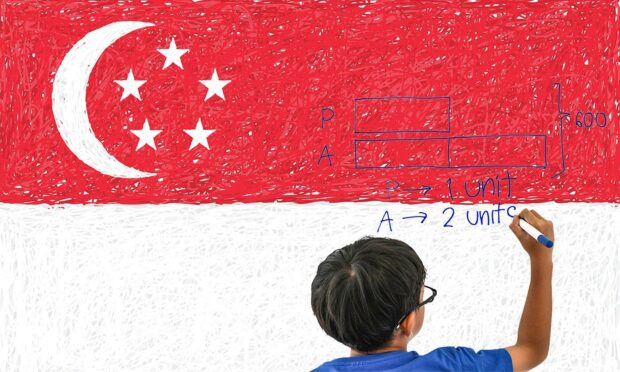The Scottish Government has had its say on the Press and Journal’s investigation into education systems abroad.
Over recent months, we have looked at how schooling works in four countries outperforming Scotland in the Pisa rankings.
We spoke to government ministers, teachers, and expat parents living in Scotland, to see what lessons Scottish schools can learn from Finland, Estonia, Singapore and China.
A Holyrood spokeswoman said the government was keen to learn from other countries.
To this end, it has established an International Council of Education Advisers, to bring in expertise from around the world, including Finland and Singapore.
Education systems across the world are judged by Pisa (Programme for International Student Assessment) tests, with results released every three years.
Pisa measures 15-year-olds’ ability to use their reading, maths and science knowledge and skills to meet real-life challenges.
Finland flying, Scotland struggling
In the most recent rankings, China came out on top in reading, maths and science. Singapore secured second place in each category.
Estonia came out top among European countries – third worldwide in reading and science, and fourth in maths.
Finland ranked second in Europe – fourth in reading and fifth in maths and science in the world.
Meanwhile, Scotland recorded its worst-ever performance in maths and science, ranked 25th and 24th among OECD nations.
Reading offered a slightly rosier picture, with Scotland ranked above Wales and Northern Ireland, though below England.
Scotland’s education system came in for criticism in an OECD report in June, leading the Scottish Government to scrap the SQA.
Same population – so why the difference?
Finland and Singapore in particular are good comparisons as, like Scotland, they both have a population around 5.5 million.
While all countries have their differences, there are things these four countries have in common.
For example, they all start school earlier in the day, but later in childhood.
School means an early start for pupils in these countries, with the first bell sounding at 7.30am in Singapore and China, and 8am in Finland and Estonia.
And while Scottish kids begin their school journey the year they turn five, in Finland, Estonia and Singapore they don’t start school until they’re seven, and in China, six.
A common factor in all four countries was the level of respect for the teaching profession, and for education as a whole.
Oona Piipponen, a primary school teacher in Finland, did her teacher training in Scotland. This included a probationary year teaching in Wick.
‘If you’re smart, you don’t teach’
She said: “When I was studying in Scotland, one of my Scottish peers said: ‘Oona, you’re so smart, why do you want to be a teacher?’
“One of the narratives that seems to be ongoing in Scotland is that if you’re smart you don’t go into teaching, you go into medicine or law or some profession like that.
“I hope that attitude can change over time.”
Singaporean Feng-yi Soh, 39, lives in Inverness with wife and three children, aged 10, eight and seven.
He said: “In most countries, teaching is not seen as a very glamorous profession.
“Young people don’t think of it as a top career. In Singapore we had to change that.
“If the teachers are not top notch, then the students are not going to be inspired.
“We thought ‘we have to make sure our brightest become teachers’. It was a bit like social engineering.”
Teachers decide, not the government
Respect for the teaching profession leads on to teacher autonomy.
In Finland and Estonia in particular, teachers and schools are given significantly more autonomy in deciding how and what to teach.
Finland’s education minister Li Andersson said Finnish education policy is “quite heavily based on autonomy for teachers and autonomy for schools. We trust our teachers, we trust their professionalism in teaching.
“We give teachers a lot of freedom when it comes to teaching methods, and also assessment of learning. That’s something that teachers appreciate.
“Trusting teachers is an important way to grow the attractiveness of the profession.
“When the profession is attractive, then you will have more motivated, gifted young people applying to study to become teachers.
“This has implications for the whole education system.”
School inspections not needed
Oona Piipponen said there isn’t the same emphasis on school inspections in Finland.
“Instead teachers are trusted to know what is best for their school and how best to implement it,” she said.
She added: “A really good thing about the Finnish system is that education is not actually under government control per se.
“The education system is developed by teachers on the inside. Curriculum development is led by those who are or have been teachers.”
Estonian schools enjoy a similar level of autonomy.
Getter Kallas, head of teaching at the Rocca al Mare School in Tallinn, said: “The schools are good because the teachers are qualified and they have the freedom to do what they think is right.”
Birgit Lao is the Estonian Diplomatic Representative for Education, and reports to the education minister.
Ms Lao was adamant about the importance of moving power away from the state, towards teachers and pupils.
‘No central restrictions or demands’
That, and the value of sticking to a policy without unnecessary meddling.
“There are no central restrictions or demands,” she said.
“How the state intervenes is it describes learning outcomes.
“But each and every school and kindergarten develops their own curriculum and methods on how to achieve these.
“This gives the flexibility to schools to choose how they teach, what they teach, what materials they use.
“Flexibility and autonomy is risky from a state point of view. But it allows and enables innovation.
“It gives you many new approaches on how to solve problems at a school level.”
Scottish curriculum ‘broad but light’
While the two northern European nations felt strongly about having less reliance on assessment, the two Asian countries felt the Scottish curriculum too ‘broad but light’.
Ms Andersson said: “The problem with standardised assessment or testing being done all the time is that it affects the whole teaching agenda.
“You start to learn for assessment. There’s not so much emphasis on learning itself and the acquiring of a broad skill set, and also individual types of learning methods.
“I think children learn better when we emphasise learning itself, rather than just knowing certain things for certain exams or tests.”
And across the water in Estonia, Ms Lao said: “Final exams are ‘yesterday’.
“Assessment happens while you browse learning materials.
“It happens when you read a chapter and we ask ‘what did you understand?’
“Final exams cause a lot of stress for students whose lives depend on the result.
“Why don’t we recognise the whole journey, rather than the final two hours?”
Violet Li, 40, is originally from Quanzhou but has lived in Aberdeen for 17 years.
With her husband Cammy and children Li, 11, and Aaron, 10 in tow, she is currently on a year-long sabbatical travelling Europe.
She said: “A clearer curriculum would be helpful.
“We’ve been trying to find out what we need to teach our kids this year while we’re away, and it’s very vague.
“The Scottish curriculum seems to be more about personality development, and lots of loose things you can’t really measure with exams.”
‘Scotland was doing so well, then they changed the curriculum’
A fellow Chinese expat, who lives in Balmedie and has two boys aged 14 and 10, said core subjects such as literacy, numeracy and IT are taught in greater depth in China than Scotland.
“They’re taught by specialized teachers too, rather than one teacher for everything,” she added.
“So although there are cultural elements to the comparison between Scottish and Chinese schools, I think the curriculum itself can make a difference.
“Scotland was doing so well previously, and then they changed the curriculum and things went downhill.
“Even if you compare the Scottish curriculum with England, it’s quite light.”
And Feng-yi said: “There is a lot of focus on science and engineering in Singapore. One has to be extremely strong in maths and sciences, and also languages.
“Here in Scotland the system is more flexible, you can study arts and more liberal subjects.
“But education in Asia is still mainly focussed on producing people who can immediately contribute to the economy.”
Fear of offence
Interestingly, the Asians the Press & Journal spoke to felt Scottish pupils had lost their competitive edge.
Aiky Goh, 37, is a Singaporean living in Inverness, where her eldest daughter attends Crown Primary School.
She said: “I don’t believe in not giving out medals during sports day for fear of offending the losers.
“Sadly, this is commonplace now in Scottish schools.
“Real life is a constant race. If kids are not taught that reality from a young age, how will they have the drive and motivation to work hard and succeed?”
And from Violet Li’s Chinese perspective, Scottish children and parents are losing out due to an “extreme” fear of hurting anyone’s feeling.
“In Scotland it can be very hard to find out if your child is doing well in school or not,” said Violet.
“The teachers tend to be very careful what they write in the end-of-term report.
“In China you have your rankings published in black and white for everyone to see. It’s perhaps cruel, but it’s effective.
“In Scotland, things have changed. Years ago, things like telling parents their child isn’t doing well would have been a fairly straightforward thing.
“Now you have to be careful. You have to be mindful of the child’s and parents’ feelings or you could get into trouble. I find that quite extreme.”
Scottish Government responds
Responding to the Press & Journal’s series on education abroad, a spokeswoman said: “We are keen for Scottish education to be informed by international best practice, which is why the First Minister established the International Council of Education Advisers, who bring expertise from a range of different systems from around the world, including Finland and Singapore.
“The OECD, in their independent report, were crystal clear that Curriculum for Excellence is the right approach for Scotland and is viewed internationally as an inspiring example of curriculum practice.
“However, 10 years on from CfE being introduced, it is right that we review how it is being implemented.
“We have set out plans for education reforms aimed at delivering the best possible outcomes for Scotland’s pupils.
“Changes to assessment and qualifications will be informed by a paper by Professor Gordon Stobart, appointed by the OECD, who considered approaches taken around the world as part of his work.”
More from the Schools and Family team
What can parents do about work when school is closed?
Long Covid in children: Parents around the world fight for their kids
Home Alone: What age is appropriate to leave kids on their own?





